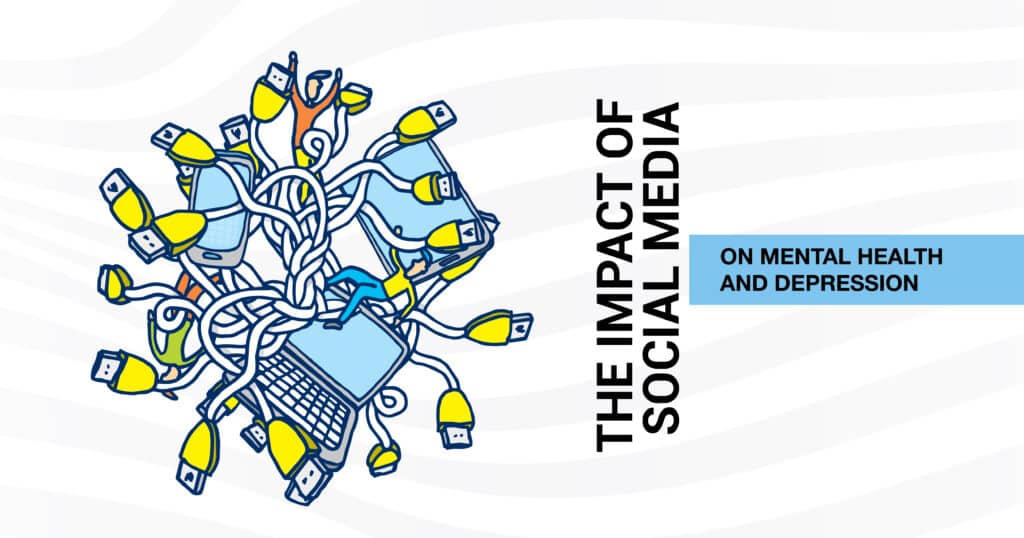Let’s face it: social media is a double-edged sword. On one hand, it connects us, offering a window into the lives of friends, family, and even celebrities. On the other hand, it can feel like a relentless highlight reel that leaves us feeling less than and out of the loop. But what exactly is the impact of social media on mental health and depression? This article will help you dive deep into this topic, unraveling how our beloved apps might affect our minds and what we can do about it.
The Rise of Social Media: A Brief Overview
Social media has exploded over the past two decades. Platforms like Facebook, Instagram, Twitter, and TikTok have become integral to our daily lives. They offer a way to share experiences, stay informed, and connect with others. But with great power comes great responsibility—or in this case, potential pitfalls.
The Good Side
– Connection: Staying in touch with loved ones, meeting new people, and maintaining relationships despite geographical distances.
– Information: Quick access to news, trends, and educational content.
– Expression: A platform to share your thoughts, creativity, and personal milestones.
The Dark Side
– Comparison: Constant exposure to others’ highlight reels can foster feelings of inadequacy.
– Addiction: The addictive nature of social media can lead to increase screen time and neglect of real-life interactions.
– Cyberbullying: The excess of the internet can lead to harmful behavior, impacting cognitive health.
The Impact of Social Media on Mental Health and Depression
So, how does social media truly impact our mental well-being? Let’s break it down.
The Comparison Trap
Scrolling through perfectly curated feeds can make you feel like everyone’s living a better life than you. This phenomenon, known as “social comparison,” can lead to feelings of envy, inadequacy, and, ultimately, depression.
– Highlight Reels vs. Reality: Remember, people tend to post their best moments online. What you see isn’t the whole story.
– Self-Esteem Issues: Constant comparison can erode self-esteem, making you doubt your worth.
The Fear of Missing Out (FOMO)
Ever felt a pang of anxiety seeing friends hanging out without you? That’s FOMO in action. It’s a significant driver of social media use and can lead to feelings of loneliness and exclusion.
– Event Overload: With every party, trip, or gathering posted online, it’s easy to feel left out.
– Anxiety and Stress: Worrying about missing out can lead to heightened anxiety and stress levels.
Cyberbullying and Harassment
The anonymity offered by social media can sometimes encourage people to behave poorly or negatively. Cyberbullying or online harassment has become a significant issue, particularly among teenagers.
– Emotional Distress: Victims of cyberbullying often experience anxiety, depression, and in severe cases, suicidal thoughts.
– Safety Concerns: Online harassment can also lead to concerns about personal safety.
Addiction and Screen Time
It’s no secret that social media can be addictive. The endless scroll of likes and notifications keeps us coming back for more, sometimes at the expense of our mental health.
– Sleep Disruption: Excessive screen time, especially before bed, can interfere with sleep patterns.
– Isolation: Isolation: Spending excessive time online can result in reduced social interactions in the real world.
Navigating Social Media for Better Mental Health
Given the potential downsides, how can we navigate the world of social media in a way that supports our mental health? Here are some tips:
Set Boundaries
– Limit Screen Time: Use apps that track and limit social media usage.
– Designate Tech-Free Times: Set specific times of the day when you unplug, such as during meals or before bed.
Curate Your Feed
– Follow Positivity: Follow accounts that inspire and uplift you rather than those that trigger negative feelings.
– Unfollow Toxicity: Don’t hesitate to unfollow or mute accounts that make you feel bad about yourself.
Be Mindful and Present
– Mindful Scrolling: Be aware of how social media makes you feel. If you notice it negatively impacting your mood, take a break.
– Real-Life Connections: Prioritize face-to-face interactions over virtual ones.
Practice Self-Compassion
– Be Kind to Yourself: Remember that everyone has bad days, and what you see online is often a polished version of reality.
- Take care of yourself: Do things that make you feel good, like exercising, enjoying your hobbies, and spending time with people you care about.
FAQs
How does social media affect mental health?
Social media can affect mental health in various ways, from fostering feelings of inadequacy and FOMO to increasing the risk of cyberbullying and addiction.
Can social media cause depression?
While social media alone may not cause depression, excessive use and negative experiences on these platforms can contribute to depressive symptoms.
How can I reduce the negative impact of social media on my mental health?
Set boundaries, curate your feed to follow positive accounts, practice mindful scrolling, and prioritize real-life connections and self-care.
Is it okay to take a break from social media?
Definitely! Stepping away from social media now and then can give you a chance to unwind and lower stress and anxiety levels.
Are there any benefits to social media?
Social media can be beneficial. It helps us keep in touch with family and friends, find information quickly, and express ourselves freely.
Conclusion
The impact of social media on mental health and depression is a complex and multifaceted issue. While these platforms offer incredible opportunities for connection and information, they pose significant risks to our well-being.
If we recognize the possible problems and take action to control how we use social media, we can maximize its advantages while reducing its negative effects.
Remember, you’re not alone in navigating this digital landscape—support is available if needed. If you or a loved one is experiencing mental health issues, talk to our team and see how we can help.








